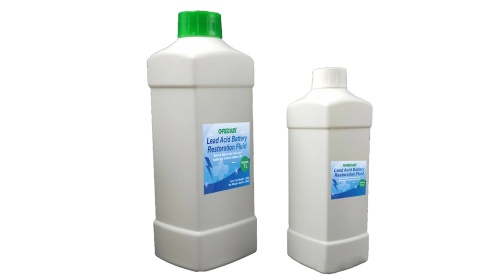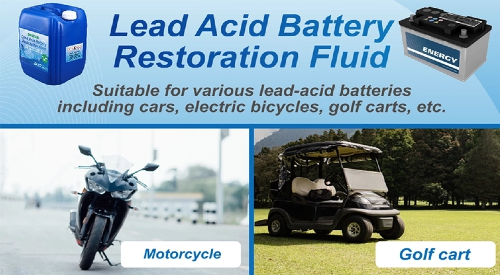
The automotive industry heavily relies on reliable batteries to ensure smooth vehicle operations. Lead acid batteries are the most common type used in cars for starting, lighting, and ignition (SLI) purposes. However, these batteries face challenges such as sulfation and electrolyte degradation, which cause premature failure. When a battery seems dead or unusable, many car owners consider replacement as the only option. However, with advances in battery technology, battery restore solutions, particularly Lead Acid Battery Restoration Fluids, offer a practical and eco-friendly way to revive these seemingly “dead” batteries.
Battery Restore Solution in Automotive Industry Applications
The automotive industry depends heavily on reliable and long-lasting batteries to ensure optimal vehicle performance. Whether it’s a conventional internal combustion engine vehicle or a modern hybrid or electric car, batteries play a critical role. Over time, however, lead acid batteries—the most commonly used type for starting and auxiliary purposes—begin to degrade due to sulfation and electrolyte imbalance. Fortunately, the emergence of advanced battery restore solutions like Lead Acid Battery Restoration Fluid offers a cost-effective and environmentally friendly method to revive and extend the life of these essential power sources.
Let’s explore how battery restore solution technology is transforming battery maintenance and performance across several key automotive applications.
1. Extending the Lifespan of Automotive Starter Batteries
One of the most common applications of battery restore solutions is in the maintenance of car starter batteries. These are lead acid batteries responsible for starting the engine and powering accessories like headlights, infotainment systems, and HVAC units when the engine is off. During regular operation, these batteries undergo repeated charge and discharge cycles, often under less-than-ideal conditions. Over time, this causes sulfation—a buildup of lead sulfate crystals on the battery plates—which significantly reduces the battery’s capacity and efficiency.
Instead of immediately replacing a battery that shows signs of deterioration, applying a Lead Acid Battery Restoration Fluid can break down the hardened sulfate crystals chemically. This process restores the reactive surface area of the lead plates, allowing for improved energy storage and delivery. Car owners benefit by extending battery life by months or even years, reducing the frequency and cost of replacements.
In addition, using a battery restore solution contributes to better engine starts, especially in colder weather, where a weakened battery is more likely to fail. Restored batteries also show increased cranking amps and more consistent voltage, ensuring vehicles operate reliably under all conditions.
2. Maintenance of Hybrid and Electric Vehicle Auxiliary Batteries
While hybrid and electric vehicles (EVs) primarily rely on lithium-ion battery packs to drive electric motors, they still incorporate traditional lead acid batteries for auxiliary purposes. These auxiliary batteries are essential for supporting 12V systems such as lighting, door locks, infotainment, and critical safety components like airbags and braking systems.
Because these batteries are often overlooked during routine maintenance, they are prone to neglect and gradual sulfation, especially when the main propulsion system receives more attention. Over time, the auxiliary battery may degrade and lead to unexpected system failures.
Using a battery restore solution like Lead Acid Battery Restoration Fluid helps to prolong the life and maintain the performance of these critical components. Restoration fluids effectively remove sulfation, clean internal components, and rebalance the electrolyte concentration. As a result, hybrid and EV owners can avoid costly downtime and ensure uninterrupted vehicle functionality.
This approach is particularly useful for fleet managers overseeing large numbers of hybrid or electric vehicles, where regular battery replacements could become a significant operational expense. Implementing a routine battery restoration program with high-quality fluids helps maintain vehicle reliability while cutting costs.
3. Combating Battery Performance Decline in Extreme Weather
One of the biggest challenges for vehicle batteries is maintaining performance in extreme weather conditions. In hot climates, high temperatures accelerate the evaporation of electrolyte fluid, leading to dry plates and internal damage. In cold climates, chemical reactions slow down, reducing the battery’s ability to deliver current, which is particularly critical during cold engine starts.
A weakened or partially sulfated battery may function adequately in mild conditions but fail completely in extreme temperatures. This makes it essential to maintain batteries in peak condition year-round.
By using a Lead Acid Battery Restoration Fluid, the internal condition of the battery can be significantly improved. These fluids rehydrate dried-out electrolyte, reduce internal resistance, and restore chemical balance—making the battery better equipped to perform reliably regardless of climate. A properly restored battery retains heat better, delivers more consistent voltage, and recovers faster after high-load events.
This is particularly beneficial in commercial vehicles, taxis, delivery trucks, and off-road vehicles that operate in diverse and often harsh environmental conditions. Regular application of a battery restore solution in such scenarios reduces the risk of unexpected breakdowns and boosts driver confidence.
4. Reducing Costs for Vehicle Owners and Service Centers
Frequent battery replacements represent a significant recurring expense for both private vehicle owners and commercial operators. Original equipment manufacturer (OEM) lead acid batteries can be costly, and improper disposal contributes to environmental pollution. Adding to this is the inconvenience of sudden battery failure, which may result in towing, service downtime, or missed appointments.
By incorporating battery restore solutions into regular maintenance protocols, these issues can be substantially mitigated. A single application of Lead Acid Battery Restoration Fluid can rejuvenate a failing battery, restoring up to 70–90% of its original capacity. For most drivers, this equates to an extra 6–18 months of battery usage, depending on driving habits and environmental conditions.
Automotive repair shops and service centers also benefit from this technology. Instead of recommending expensive replacements, they can offer restoration services as a value-added, eco-friendly alternative. This boosts customer satisfaction while also improving workshop revenue. Fleet operators with dozens or hundreds of vehicles experience even greater financial relief when restoration is applied at scale.
Furthermore, battery restore solutions support corporate and personal sustainability goals. Fewer discarded batteries mean reduced toxic waste, less lead mining, and a lower environmental footprint overall.

Lead Acid Battery Restoration Fluid vs. Traditional Maintenance Methods
Advantages Over Simple Charging and Electrolyte Replacement
Traditional approaches to battery maintenance include regular charging and, in some cases, replacing the electrolyte fluid. However, these methods cannot remove hardened lead sulfate deposits that block plate surfaces. A simple recharge only dissolves fresh sulfate deposits but leaves hardened crystals intact.
Lead Acid Battery Restoration Fluids chemically break down these stubborn sulfates, achieving deeper cleaning and restoration beyond the capabilities of conventional methods.
Comparison with Other Battery Additives
There are various battery additives on the market, but many serve only to supplement electrolyte levels or slightly improve conductivity. Restoration fluids offer a more targeted approach, addressing the root sulfation problem chemically rather than masking symptoms.
Safety and Ease of Use
Modern restoration fluids are designed with safety and convenience in mind. They typically require minimal handling steps, do not emit harmful fumes, and are compatible with standard automotive battery designs. This contrasts with some traditional additives that may be corrosive or require complex procedures.
Real-World Results and User Feedback
Measurable Improvements in Capacity and Voltage
Many automotive repair shops and vehicle owners have reported substantial improvements after using Lead Acid Battery Restoration Fluid. Typical results show a capacity recovery rate between 70% and 90%, with voltage returning close to factory specifications. These improvements translate directly into better vehicle start reliability and longer battery life.
Success Stories from Automotive Service Centers
Multiple case studies document restored batteries in passenger vehicles, commercial trucks, and fleet vehicles after fluid treatment. Repair centers often find this solution an invaluable tool to reduce customer costs and improve service satisfaction.
Economic and Environmental Benefits
Beyond cost savings, using battery restore solutions contributes positively to environmental sustainability by reducing battery waste and lowering the demand for new battery manufacturing, which involves mining and energy-intensive processes.
Conclusion
Battery restore solutions, particularly Lead Acid Battery Restoration Fluids, represent a powerful, scientifically backed method to extend the lifespan and improve the performance of automotive lead acid batteries. By chemically reversing sulfation and restoring electrolyte balance, these solutions help car owners and automotive professionals save money, reduce waste, and support greener automotive maintenance practices.
As the automotive industry continues to prioritize sustainability and cost efficiency, battery restore solutions will become an increasingly essential component of battery care and management. Investing in this technology today means prolonging battery life, reducing environmental impact, and ensuring more reliable vehicle performance tomorrow.
If you want to learn more about effective battery restore solutions or find high-quality Lead Acid Battery Restoration Fluids, consider contacting trusted industry leaders like RedSun Group, who specialize in advanced battery care products and services tailored for automotive and industrial needs.
English
العربية
Français
Русский
Español
Português
Deutsch
italiano
日本語
한국어
Nederlands
Tiếng Việt
ไทย
Polski
Türkçe
አማርኛ
ພາສາລາວ
ភាសាខ្មែរ
Bahasa Melayu
ဗမာစာ
தமிழ்
Filipino
Bahasa Indonesia
magyar
Română
Čeština
Монгол
қазақ
Српски
हिन्दी
فارسی
Kiswahili
Slovenčina
Slovenščina
Norsk
Svenska
українська
Ελληνικά
Suomi
Հայերեն
עברית
اردو
Afrikaans
Gaeilge
नेपाली
Aymara
Беларуская мова
guarani
Krio we dɛn kɔl Krio
Runasimi
Wikang Tagalog













